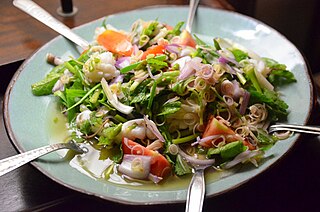
Cantonese or Guangdong cuisine, also known as Yue cuisine, is the cuisine of Cantonese people, associated with the Guangdong province of China, particularly the provincial capital Guangzhou, and the surrounding regions in the Pearl River Delta including Hong Kong and Macau. Strictly speaking, Cantonese cuisine is the cuisine of Guangzhou or of Cantonese speakers, but it often includes the cooking styles of all the speakers of Yue Chinese languages in Guangdong.

Louisiana Creole cuisine is a style of cooking originating in Louisiana, United States, which blends West African, French, Spanish, and Native American influences, as well as influences from the general cuisine of the Southern United States.

Malay cuisine is the traditional food of the ethnic Malays of Southeast Asia, residing in modern-day Malaysia, Indonesia, Singapore, Brunei, Southern Thailand and the Philippines as well as Cocos Islands, Christmas Island, Sri Lanka and South Africa.

Fried rice is a dish of cooked rice that has been stir-fried in a wok or a frying pan and is usually mixed with other ingredients such as eggs, vegetables, seafood, or meat. It is often eaten by itself or as an accompaniment to another dish. Fried rice is a popular component of East Asian, Southeast Asian and certain South Asian cuisines, as well as a staple national dish of Indonesia. As a homemade dish, fried rice is typically made with ingredients left over from other dishes, leading to countless variations. Fried rice first developed during the Sui dynasty in China.

Pancit, also spelled pansít, is a general term referring to various traditional noodle dishes in Filipino cuisine. There are numerous types of pancit, often named based on the noodles used, method of cooking, place of origin or the ingredients. Most pancit dishes are characteristically served with calamansi, which adds a citrusy flavor profile.

Noodle soup refers to a variety of soups with noodles and other ingredients served in a light broth. Noodle soup is a common dish across East Asia, Southeast Asia and the Himalayan states of South Asia. Various types of noodles are used, such as rice noodles, wheat noodles and egg noodles.

Chinese Indonesian cuisine is characterized by the mixture of Chinese with local Indonesian style. Chinese Indonesians, mostly descendant of Han ethnic Hokkien and Hakka speakers, brought their legacy of Chinese cuisine, and modified some of the dishes with the addition of Indonesian ingredients, such as kecap manis, palm sugar, peanut sauce, chili, santan and local spices to form a hybrid Chinese-Indonesian cuisine. Some of the dishes and cakes share the same style as in Malaysia and Singapore, known as Nyonya cuisine by the Peranakan.

Rice vermicelli is a thin form of noodle. It is sometimes referred to as "rice noodles" or "rice sticks", but should not be confused with cellophane noodles, a different Asian type of vermicelli made from mung bean starch or rice starch rather than rice grains themselves.

Korean Chinese cuisine, also known as Sino–Korean cuisine, is a hybrid cuisine developed by the ethnic Chinese in Korea.

Bicol express, known natively in Bikol as sinilihan, is a popular Filipino dish which was popularized in the district of Malate, Manila, but made in traditional Bicolano style. It is a stew made from long chili peppers or small chili peppers, coconut milk/coconut cream, shrimp paste or stockfish, onion, pork, ginger and garlic. The dish was termed by Laguna resident, Cely Kalaw, during a cooking competition in the 1970s in Malate, Manila. The name of the dish was inspired by the Bicol Express railway train that operated from Tutuban, Manila to Legazpi, Albay. The widely-known name for this dish in the Bicol Region of the Philippines was identified as gulay na may lada, which is currently one of the vegetarian variants of the Bicol express dish. As time progressed, variants of the Bicol express dish expanded with seafood, beef, pescatarian, vegetarian, vegan, and other versions. The preparations for these dishes vary according to the meat present within the dish. In terms of nutritional value, the original version of the Bicol express dish is beneficial in protein but unhealthy in regards to its high levels of saturated fats and cholesterol. The dish has moved into food processing and commercial production so that it can be sold conveniently and stored for a longer period of time.

Javanese cuisine is the cuisine of Javanese people, a major ethnic group in Indonesia, more precisely the province of Central Java, Yogyakarta and East Java.

Salads that are internationally known as Thai salads with a few exceptions fall into four main preparation methods. In Thai cuisine these are called yam, tam, lap and phla. A few other dishes can also be regarded as being a salad.

Hot pot or hotpot, also known as steamboat, is a dish of soup/stock kept simmering in a pot by a heat source on the table, accompanied by an array of raw meats, vegetables and soy-based foods which diners quickly cook by dip-boiling in the broth.

Acehnese cuisine is the cuisine of the Acehnese people of Aceh in Sumatra, Indonesia. This cuisine is popular and widely known in Indonesia. Arab, Persian, and Indian traders influenced food culture in Aceh although flavours have substantially changed their original forms. The spices combined in Acehnese cuisine are commonly found in Indian and Arab cuisine, such as ginger, pepper, coriander, cumin, cloves, cinnamon, cardamom, and fennel.

Indonesian noodles are a significant aspect of Indonesian cuisine which is itself very diverse. Indonesian cuisine recognizes many types of noodles, with each region of the country often developing its own distinct recipes.















